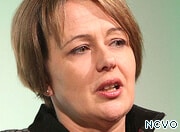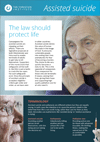Disabled people and the elderly could feel pressure to kill themselves if assisted suicide is introduced, a Paralympic star has warned.
Efforts to change the current law also reinforce “deep-seated beliefs that the lives of terminally ill and disabled people are not worth as much as other people’s”, she said.
In a letter to The Daily Telegraph, 16-time Paralympic medal winner Baroness Tanni Grey-Thompson and the leaders of disability charities Scope and Disability Rights UK said they were “deeply concerned” about pressure to introduce assisted suicide.
Oppose
The comments come as Patrick Harvie MSP is seeking to introduce the practice in Scotland, and Lord Falconer has introduced a Bill to do the same in England and Wales.
In the letter, the campaigners warned: “Many disabled people strongly oppose legalising assisted suicide.”
They added: “Why is it that when people who are not disabled want to commit suicide, we try to talk them out of it, but when a disabled person wants to do so, we focus on how we can make that possible?
“The campaign to legalise assisted suicide reinforces deep-seated beliefs that the lives of terminally ill and disabled people are not worth as much as other people’s”.
Safeguards
A leading psychiatrist has also said it would be impossible to put safeguards in legislation on assisted suicide “that would protect vulnerable, sick and elderly people”.
Shelia Hollins, a former president of the Royal College of Psychiatrists, also said assessing the mental capacity of people who want assisted suicide is a “complex process”.
It “isn’t like checking the oil or water level in a car”, she commented, ahead of Lord Falconer’s Bill being introduced.
Hollins also said: “We would do well to remind ourselves what the law is there for.
Protect
“It’s there to protect us, all of us and especially the most vulnerable amongst us, not to satisfy the determined choices of a vocal minority.
“Fear about dying calls for better palliative care services, a field in which Britain is already a world leader, and for a public that is better informed about the realities, rather than the scare stories, about death and dying”.


